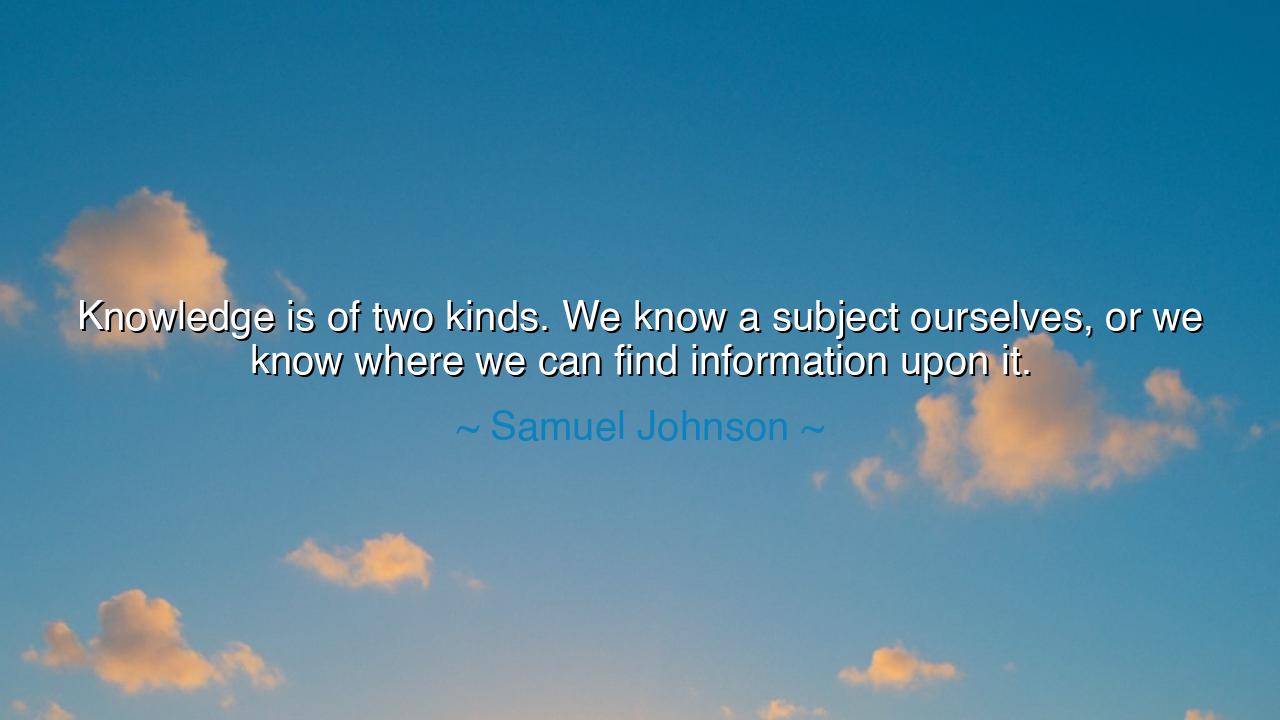
Knowledge is of two kinds. We know a subject ourselves, or we
Knowledge is of two kinds. We know a subject ourselves, or we know where we can find information upon it.






Hear now the words of Samuel Johnson, the great lexicographer and sage of the eighteenth century, who declared with clarity and thunder: “Knowledge is of two kinds. We know a subject ourselves, or we know where we can find information upon it.” These words, simple in their form, are vast as the sea in their depth. They call us to recognize the twin pillars upon which all human wisdom rests: the mastery of what we hold within our own minds, and the skill of reaching outward, toward the repositories of wisdom beyond us. To know one thing by the sweat of study is power, but to know the path to knowledge is survival itself.
In the days of the ancients, when scrolls were rare and memory was the treasury of the learned, the first kind of knowledge—that which lives within a man’s breast—was honored like a crown. The sage who recited the laws, the poet who recalled the song of heroes, the mathematician who etched the stars in his mind—all were living libraries. Yet even then, the second kind of knowledge revealed its strength: for not all men could carry every truth within themselves, but those who knew where to find the law, where to hear the song, where to read the stars, stood equal to the wisest. The farmer who could not read but knew which elder to ask, the warrior who sought counsel from the priest before battle—such men wielded the second kind of wisdom, and were not diminished by their lack.
Consider the tale of Alexander the Great. Though mighty in war, he carried with him a chest of books, among them the Iliad, which he kept under his pillow. He was not content with the sword alone, for he knew that information and guidance shaped destiny more surely than steel. Did Alexander himself master every science? No. But he knew where to draw counsel—from Aristotle his teacher, from scholars, from the writings of those long gone. Thus, his empire was not forged by strength alone, but by an embrace of both kinds of knowledge: that which he bore within, and that which he reached for beyond.
There is a lesson here for us who live in an age overflowing with words and voices. Many chase after the illusion of knowing everything, only to drown in the flood of facts. Others despair, thinking themselves ignorant, because they cannot store all wisdom in their frail minds. But Johnson reminds us: true mastery does not require omniscience. It requires direction. If you know the answer, speak it. If you do not, know the path that leads to it. The map is as precious as the treasure; the compass is as vital as the destination.
Indeed, the modern world is a testament to the second kind of knowledge. When the physician heals, does he carry every disease in his mind? No—he consults the ancient texts and the latest journals. When the engineer builds, does she rely only on memory? No—she searches diagrams, studies archives, and queries colleagues. Even the humble villager, who may not hold the sum of wisdom, knows which elder, which book, or which tool to seek. And this, too, is knowledge—to know where the flame is kept, even if you do not bear the fire.
Yet beware, O listener, for the second kind of knowledge demands humility. To seek another source is to admit one’s limits, and pride resists such confessions. But wisdom is not pride—it is surrender to truth. Better to bow and ask than to stand proud in error. The man who pretends to know all closes his ears, but the one who asks opens the gate of learning. Thus, the second kind of knowledge is also the way of the humble, the seeker, the true disciple of wisdom.
Therefore, let this be the lesson: Arm yourself with both kinds of knowledge. Strive daily to master the truths you can, shaping your mind into a vessel of clarity. Yet also cultivate the art of seeking—learn the paths to libraries, the voices of teachers, the tools of search. Build not only memory, but also method; not only learning, but also direction. When faced with ignorance, do not despair, for you hold the power to ask, to seek, to find.
In your own life, take up these practical actions: Each day, learn one truth by heart, that your mind may grow strong. Each week, mark one place, one source, one guide where wisdom may be found again. Keep your books close, your mentors closer, and your paths to knowledge always open. Thus, you will walk as the ancients walked, strong both in what you hold and in what you can seek. And in this way, you shall never stand empty before the challenges of the world.






AAdministratorAdministrator
Welcome, honored guests. Please leave a comment, we will respond soon